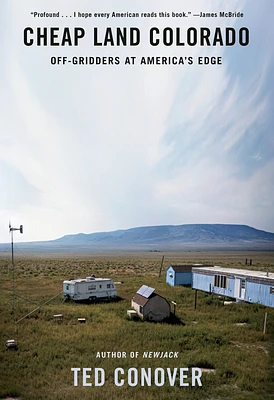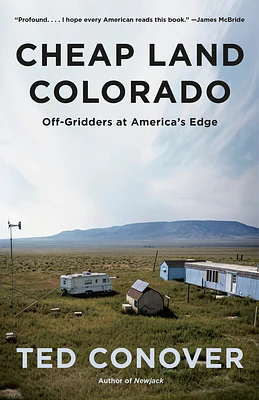Home
Cheap Land Colorado: Off-Gridders at America's Edge
Loading Inventory...
Barnes and Noble
Cheap Land Colorado: Off-Gridders at America's Edge
Current price: $20.00


Barnes and Noble
Cheap Land Colorado: Off-Gridders at America's Edge
Current price: $20.00
Loading Inventory...
Size: Audiobook
*Product Information may vary - to confirm product availability, pricing, and additional information please contact Barnes and Noble
From Pulitzer Prize finalist and National Book Critics Circle Award–winning author of
Newjack
, a passage through an America lived wild and off the grid, where along with independence and stunning views come fierce winds, neighbors with criminal pasts, and minimal government and medical services
“In these dispatches, [Conover] invites readers to ride shotgun along an unraveling edge of the American West, where sepia-toned myths about making a fresh start collide with modern modes of alienation, volatility, and exile.... In a nation whose edges have come to define its center, this is essential reading.”—Jessica Bruder, author of
Nomadland: Surviving America in the Twenty-First Century
In May 2017, Ted Conover went to Colorado to explore firsthand a rural way of life that is about living cheaply, on your own land—and keeping clear of the mainstream. The failed subdivisions of the enormous San Luis Valley make this possible. Five-acre lots on the high prairie can be had for five thousand dollars, sometimes less.
Conover volunteered for a local group trying to prevent homelessness during the bitter winters. He encountered an unexpected diversity: veterans with PTSD, families homeschooling, addicts young and old, gay people, people of color, lovers of guns and marijuana, people with social anxiety—most of them spurning charity and aiming, and sometimes failing, to be self-sufficient. And more than a few predicting they’ll be the last ones standing when society collapses.
Conover bought his own five acres and immersed himself for parts of four years in the often contentious culture of the far margins. He found many who dislike the government but depend on its subsidies; who love their space but nevertheless find themselves in each other’s business; who are generous but wary of thieves; who endure squalor but appreciate beauty. In their struggles to survive and get along, they tell us about an America riven by difference where the edges speak more and more loudly to the mainstream.
Newjack
, a passage through an America lived wild and off the grid, where along with independence and stunning views come fierce winds, neighbors with criminal pasts, and minimal government and medical services
“In these dispatches, [Conover] invites readers to ride shotgun along an unraveling edge of the American West, where sepia-toned myths about making a fresh start collide with modern modes of alienation, volatility, and exile.... In a nation whose edges have come to define its center, this is essential reading.”—Jessica Bruder, author of
Nomadland: Surviving America in the Twenty-First Century
In May 2017, Ted Conover went to Colorado to explore firsthand a rural way of life that is about living cheaply, on your own land—and keeping clear of the mainstream. The failed subdivisions of the enormous San Luis Valley make this possible. Five-acre lots on the high prairie can be had for five thousand dollars, sometimes less.
Conover volunteered for a local group trying to prevent homelessness during the bitter winters. He encountered an unexpected diversity: veterans with PTSD, families homeschooling, addicts young and old, gay people, people of color, lovers of guns and marijuana, people with social anxiety—most of them spurning charity and aiming, and sometimes failing, to be self-sufficient. And more than a few predicting they’ll be the last ones standing when society collapses.
Conover bought his own five acres and immersed himself for parts of four years in the often contentious culture of the far margins. He found many who dislike the government but depend on its subsidies; who love their space but nevertheless find themselves in each other’s business; who are generous but wary of thieves; who endure squalor but appreciate beauty. In their struggles to survive and get along, they tell us about an America riven by difference where the edges speak more and more loudly to the mainstream.


















